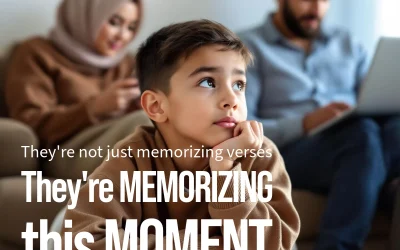“Stop wasting time on those games!” you tell your teenager. Then you settle into the couch for another Netflix binge. Through the time-efficiency lens, you’re relaxing (justified) and they’re wasting time (guilty). But what if there’s another lens entirely?
Here’s something that made me deeply uncomfortable: I realized I’m that parent.
Not literally (well, sometimes literally), but in principle. I judge certain activities as “time-wasting” while giving myself a free pass for things that might be far worse when viewed through a different lens.
Let me show you what I mean.
The Double Standard We Don’t See
Picture this familiar scene:
Parent watches Netflix for three hours: “I deserve to unwind after a hard day.”
Kid plays video games for one hour: “You’re wasting your life on that screen!”
Same screen. Same disconnection. Different judgment.
Or this one:
You scroll social media during lunch: “Just taking a mental break.”
Colleague sits quietly in prayer: “Why are they wasting work time?”
When I reflect on the Quran’s reminders about how we’ll be questioned about our time (and yes, every moment of it), I realized something uncomfortable: maybe we’re asking the wrong question entirely.
We keep asking: “Am I wasting time?”
Perhaps we should ask: “Am I wasting life?”
And here’s where it gets really uncomfortable – that lens shift exposes things we’d rather not see.
The Lens That Changes Everything
Think of it like switching from a regular mirror to one of those brutally honest magnifying mirrors. Same face, but suddenly you see things you’ve been missing.
Let’s try it with your actual activities. Please take a moment and honestly answer:
That thing you criticized someone else for – apply the life lens to your equivalent:
Time lens thinking:
“My teenager wastes time gaming” = Bad
“I watch Netflix” = Deserved relaxation
Life lens thinking:
“Are we both disconnecting from our purpose?” = Equally concerning
“Am I modeling the consciousness I want them to have?” = Uncomfortable question
Here’s what I discovered when I applied this to my own life:
Time lens: Working through prayer times shows dedication.
Life lens: I’m too busy for the One who gave me the job in the first place.
Time lens: Quickly scrolling past a friend’s call because I’m “productive.”
Life lens: I’m too efficient to nurture the bonds that make life meaningful.
Time lens: Multitasking during family dinner saves time.
Life lens: I’m trading irreplaceable moments for an illusion of efficiency.
See how it strips away our justifications?
When “Good Things” Waste Life
Here’s the part that keeps me up at night (besides that late coffee): Sometimes the things that look most impressive through society’s lens might be the biggest waste through life’s lens.
Think about these scenarios:
The Career Star:
Society sees: Ambitious professional, always available, climbing the ladder
Life lens reveals: Someone who’s mastered their inbox but can’t remember their last heartfelt prayer
They’re succeeding at everything except the reason they exist
The Helpful Hero:
Society sees: Always there for everyone, never says no, selfless
Life lens reveals: So busy helping others they’ve forgotten to connect with their Creator
When I reflect on verses about those who do good deeds but forget God (like in 18:103-104), it makes me wonder – can we be so efficient at kindness that we miss the entire point of being kind?
The Efficient Parent:
Society sees: Provides everything, works hard, plans perfectly
Life lens reveals: Children have every material thing except a parent who’s truly present
Optimizing childhood while missing its moments
This isn’t about judging these people (I’ve been all of them at different times!). It’s about recognizing that sometimes our “best” through one lens is our “lost” through another.
How to Actually Know: A Simple Framework
So how do you know if something is wasting your time or wasting your life? Here’s what I’ve started asking myself:
Instead of “Is this productive?” try asking:
“Would I be comfortable doing this if these were my last moments?”
“Does this action connect me to my purpose or disconnect me?”
“If I’m judging someone else for this, am I guilty of something equivalent?”
That last question is the one that really hurts. In a good way.
The Parent-Netflix Test:
Whenever you catch yourself judging someone for “wasting time,” try this:
What are they doing? (Gaming, praying, socializing, daydreaming)
What’s your equivalent? (Scrolling, postponing prayer, avoiding people, overthinking)
Apply the life lens to BOTH
I had to laugh at myself when I realized:
I judge my son’s gaming while I endlessly scroll
I judge the “unproductive” colleague while I fill my day with busywork that doesn’t matter eternally
I judge my friend’s “excessive” prayer time while I can’t find five minutes for my Creator
The life lens doesn’t play favorites. It sees through all our justifications.
The Uncomfortable Gift
When I ponder the Quran’s description of how quickly this life passes – like an afternoon or a morning (79:46) – it makes me think about how we measure our days.
We’re so careful about:
Not wasting money
Not wasting food
Not wasting resources
But somehow we’re careless about wasting consciousness, wasting presence, wasting our connection to why we’re here.
And here’s the really uncomfortable part: We often waste life while congratulating ourselves on not wasting time.
It’s like being proud of polishing the brass on a sinking ship. The efficiency is real, but the direction is wrong.
What This Actually Looks Like
So what changes when you start seeing through the life lens? Not everything has to transform dramatically. You don’t need to quit your job or throw away your phone (though I did consider it after my third 3 AM scroll session).
Maybe it looks like this:
Morning coffee:
Before: Check emails, optimize, multitask
After: Same coffee, but now it’s a daily appointment with consciousness
Nothing changed except everything changed
Work project:
Before: Race to be most efficient
After: Same work, but remembering who gave you the ability to work
Same tasks, different heart
Evening Netflix:
Before: Mindless unwinding (while judging others)
After: Choosing rest consciously, without the hypocrisy
Maybe even asking: Is this rest, or is this escape?
The beautiful thing? You start to see your own patterns, not just judge others’.
When your teenager plays video games now, instead of immediately judging, perhaps you pause and think: “Am I modeling the consciousness I want them to have? What’s my equivalent disconnect?”
That’s when real change begins – when the lens sees you too.
The next time you catch yourself judging someone for “wasting time,” please pause and apply that same lens to yourself. You might discover, as I did, that we’re all struggling with the same thing – just wearing different disguises.



